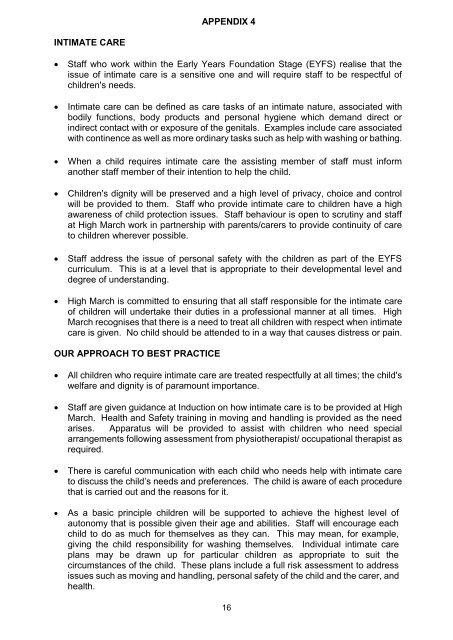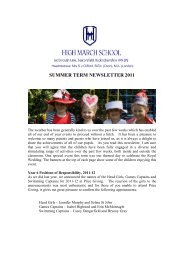Child Protection and Safeguarding Policy - High March School
Child Protection and Safeguarding Policy - High March School
Child Protection and Safeguarding Policy - High March School
Create successful ePaper yourself
Turn your PDF publications into a flip-book with our unique Google optimized e-Paper software.
APPENDIX 4INTIMATE CAREStaff who work within the Early Years Foundation Stage (EYFS) realise that theissue of intimate care is a sensitive one <strong>and</strong> will require staff to be respectful ofchildren's needs.Intimate care can be defined as care tasks of an intimate nature, associated withbodily functions, body products <strong>and</strong> personal hygiene which dem<strong>and</strong> direct orindirect contact with or exposure of the genitals. Examples include care associatedwith continence as well as more ordinary tasks such as help with washing or bathing.When a child requires intimate care the assisting member of staff must informanother staff member of their intention to help the child.<strong>Child</strong>ren's dignity will be preserved <strong>and</strong> a high level of privacy, choice <strong>and</strong> controlwill be provided to them. Staff who provide intimate care to children have a highawareness of child protection issues. Staff behaviour is open to scrutiny <strong>and</strong> staffat <strong>High</strong> <strong>March</strong> work in partnership with parents/carers to provide continuity of careto children wherever possible.Staff address the issue of personal safety with the children as part of the EYFScurriculum. This is at a level that is appropriate to their developmental level <strong>and</strong>degree of underst<strong>and</strong>ing.<strong>High</strong> <strong>March</strong> is committed to ensuring that all staff responsible for the intimate careof children will undertake their duties in a professional manner at all times. <strong>High</strong><strong>March</strong> recognises that there is a need to treat all children with respect when intimatecare is given. No child should be attended to in a way that causes distress or pain.OUR APPROACH TO BEST PRACTICEAll children who require intimate care are treated respectfully at all times; the child'swelfare <strong>and</strong> dignity is of paramount importance.Staff are given guidance at Induction on how intimate care is to be provided at <strong>High</strong><strong>March</strong>. Health <strong>and</strong> Safety training in moving <strong>and</strong> h<strong>and</strong>ling is provided as the needarises. Apparatus will be provided to assist with children who need specialarrangements following assessment from physiotherapist/ occupational therapist asrequired.There is careful communication with each child who needs help with intimate careto discuss the child’s needs <strong>and</strong> preferences. The child is aware of each procedurethat is carried out <strong>and</strong> the reasons for it.As a basic principle children will be supported to achieve the highest level ofautonomy that is possible given their age <strong>and</strong> abilities. Staff will encourage eachchild to do as much for themselves as they can. This may mean, for example,giving the child responsibility for washing themselves. Individual intimate careplans may be drawn up for particular children as appropriate to suit thecircumstances of the child. These plans include a full risk assessment to addressissues such as moving <strong>and</strong> h<strong>and</strong>ling, personal safety of the child <strong>and</strong> the carer, <strong>and</strong>health.16





